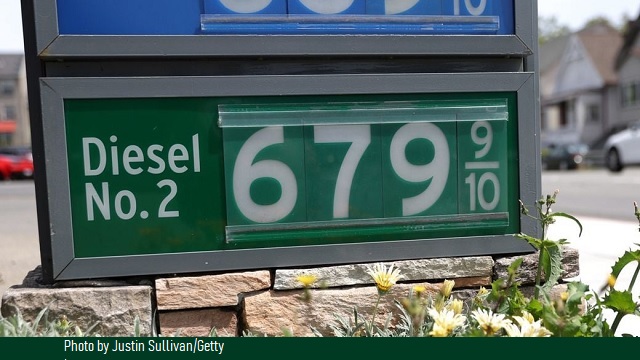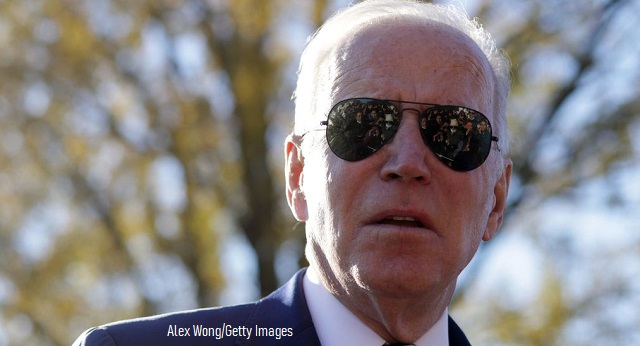The Country Is In The Middle Of A Diesel Crisis — And The Biden Admin Is Making It Worse, Experts Say

UPDATE:
Here come the diesel shortages.. which will lead to countless other shortages. pic.twitter.com/Q44sUuhWf7
— Ryan Fournier (@RyanAFournier) November 7, 2022
- The Biden administration’s policies reduced diesel production and caused stockpiles to fall to dangerously low levels, experts told the DCNF.
- “There’s an enormous tax and regulatory burden that the Biden administration has put on refining along with other industries,” Josh Young, chief investment officer and founder of energy investment firm Bison Interests, told the DCNF.
- “At the moment refining capacity cannot meet demand, even when we have enough oil,” Institute For Energy Research Senior Vice President Dan Kish told the DCNF.
The Biden administration has implemented policies that have hurt diesel production and caused stockpiles to hit their lowest levels since 2008, experts told the DCNF.
The U.S. is facing a diesel shortage which is causing the Biden administration to consider taking action to shore up supplies as fuel refiners struggle to produce enough fuel to meet heavy demand. Diesel supplies have become dangerously low due to recent refinery closures that have been exacerbated by the Biden administration’s regulations as well as increased fuel demand following the coronavirus pandemic, experts told the DCNF.
“There’s an enormous tax and regulatory burden that the Biden administration has put on refining along with other industries,” Josh Young, chief investment officer and founder of energy investment firm Bison Interests, told the DCNF. “Emissions rules and general regulations have increased tremendously under the Biden administration, raising operating costs and causing some refineries to either shut down or not expand operations.”
“There’s an enormous tax and regulatory burden that the Biden administration has put on refining along with other industries,” Josh Young, chief investment officer and founder of energy investment firm Bison Interests, told the DCNF. “Emissions rules and general regulations have increased tremendously under the Biden administration, raising operating costs and causing some refineries to either shut down or not expand operations.”
Crude oil, which is pumped in the U.S. or imported, must be processed at refineries to produce distillate fuels like diesel and gasoline. The Biden administration has continuously imposed environmental policies to cut carbon emissions and achieve “environmental justice” which have damaged refiners’ output.
Limetree Bay Energy in June closed down its U.S. Virgin Islands refinery, a facility that could process 210,000 oil barrels per day, as it could not afford to install special emission monitors that were mandated by the Environmental Protection Agency, according to Reuters. The refinery reopened in February; however, in May the EPA forced the plant to temporarily close and ordered the plant to install 18 sulfur dioxide and hydrogen sulfide monitors before it restarted operations.
The EPA in April rescinded exemptions that would have allowed over 30 refiners to avoid blending renewable biofuels into diesel even though refiners claimed that this would hike costs and decrease output, according to an agency docket. Companies in the U.S. have also not built a major oil refinery in 50 years due to regulatory concerns and anticipation that the green transition will kill demand for fossil fuels.
The coronavirus pandemic, which shut down economic activity, has also contributed to diesel shortages, according to Patrick De Haan head of petroleum analysis at GasBuddy.
“COVID caused demand to suddenly plummet to the point where refineries started to idle and companies shut down their facilities back in 2020,” De Haan told the DCNF. “As we recovered from COVID there was a surge in demand that we saw for not only diesel but other products as well and that’s put us in a situation where we have only 25 days of distillate supply remaining.”
Diesel demand recovered much faster than refiners anticipated, meaning that production has to catch up to meet demand, Institute For Energy Research Senior Vice President Dan Kish told the DCNF. The U.S. has lost more than one million barrels per day of refining capacity since 2020, according to the Energy Information Administration.
“At the moment refining capacity cannot meet demand, even when we have enough oil,” Kish said.
White House National Economic Council Director Brian Deese said on Oct. 19 that the administration is “very concerned” about diesel shortages, particularly in the northeast of the country, and indicated that the White House may limit or ban exports of refined petroleum products. The American Petroleum Institute and the American Fuel and Petrochemical Manufacturers, two industry groups, sent a letter to Energy Secretary Jennifer Granholm on Oct. 4 claiming that an export ban would exacerbate shortages.
“An export ban would distort the market and essentially force refineries out of business which is the opposite of what is needed right now,” Young said.
The administration could also deploy the Northeast Home Heating Oil Reserve’s one million barrels of diesel to address shortages in New England. However, because diesel demand is so high, the reserve’s supply would last less than six hours, according to The Washington Post.
Diesel inventories are in good shape when there are around 35 to 40 days of supply available; however, when there are just 30 days of supply left or fewer, problems can start to arise, according to Mansfield Energy. When there are only 25 days left of diesel supply, there is not enough fuel to keep industries operating if supplies are significantly disrupted, as fuel must be delivered via pipelines, meaning that vast quantities of fuel are days or weeks away from getting to where they need to be.
Diesel demand will further increase as cold weather approaches since 82% of households use diesel to heat their homes during the winter, according to the EIA.
“As NOAA’s forecasts warmer-than-average temperatures in the Southeastern U.S. and along the Atlantic coast this winter, DOE remains fully engaged and partnered with state, industry, and interagency partners as the country prepares with the winter season,” an Energy spokesperson told the DCNF.
The White House did not immediately respond to the Daily Caller News Foundation’s request for comment.
AUTHOR
JACK MCEVOY
Energy & environmental reporter.
RELATED ARTICLES:
Here’s How Biden’s Backroom Deal To Boost Oil Production Ahead Of The Midterms Fell Apart
Dem Pollster Claims Party Doesn’t Acknowledge People’s ‘Legitimate Concerns’
McCarthy, GOP Poised To Pounce In ’23. Here’s Their ‘Number One Promise’
EDITORS NOTE: This Daily Caller column is republished with permission. ©All rights reserved. Content created by The Daily Caller News Foundation is available without charge to any eligible news publisher that can provide a large audience. For licensing opportunities of our original content, please contact licensing@dailycallernewsfoundation.org.

